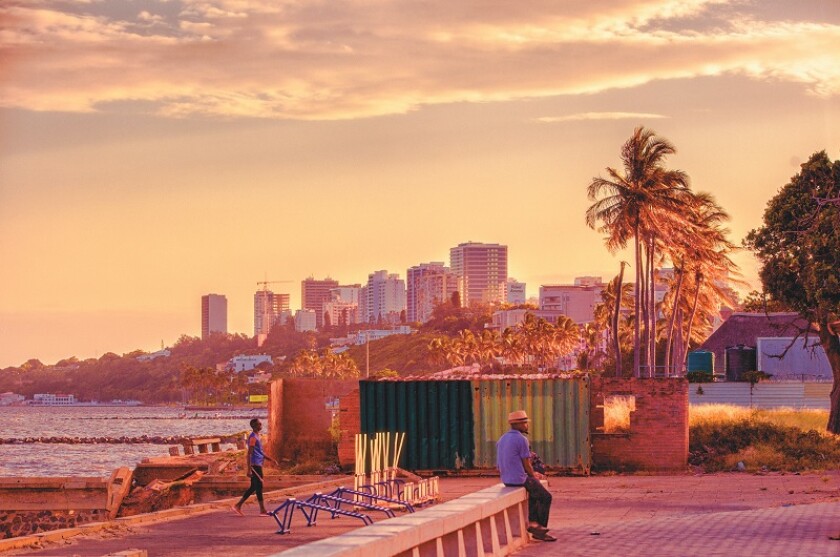It is difficult to remember the last time countries had to face, at the global scale, a threat that raised so much uncertainty regarding what to expect from the future and what the new normal will look like. Let us hope Covid-19 has alerted us all to the worlds' volatility and to the need of more collaboration between countries and people from all continents.
With a history of numerous crises following the end of the civil war, including repeated natural disasters – cyclones Idai and Kenneth in 2019, the floods of 2000, recurring droughts and floods, and repeated cholera outbreaks and pandemics – Mozambique has been well prepped to respond quickly and effectively to a health crisis such as the Covid-19 pandemic. It is a pandemic that required an immediate response and a mobilisation of means to provide medical and humanitarian assistance, even when available resources are limited. Mozambique could do this mainly because it has put in place a monitoring mechanism to respond and manage calamities, coordinated by the National Calamity Management Institute (Instituto Nacional de Gestão de Calamidades), an organisation that is present across the country and that is permanently vigilant and on call.
Mozambique announced its first Covid-19 case on March 22 and by May 12, it had a total of only 103 reported positive Covid-19 cases, most of them located in Maputo and in the Cabo Delgado province, and still with no human casualties.
Even if some construction works had to be suspended and several expatriate workers were forced to leave the country, the promising $20 billion LNG project in northern Mozambique, Africa's largest LNG project, seems to continue on track, focused on keeping its critical activity. The Mozambique LNG plant may start its operations by 2024, aiming to produce 12.9 million tonnes per annum (Mtpa) of LNG, most of it already sold to Asian and European buyers.
The Mozambican government was quick to adopt a series of measures to prevent the spread of the virus. These included limiting the movement into and out of the country, restricting gatherings, reducing the number of workers in the public and private sectors, and declaring the mandatory use of masks in public spaces. The measures seem to have produced positive results up to this point in the fight against the coronavirus. However, like in all countries affected by this pandemic, the coming months will reveal the real impact of the measures on people's lives and on the economy of this resilient, beautiful and promising sub-Saharan African Lusophone country.
Although the impact is far from negligible, one could say that so far Mozambique's experience and prospects remain positive. Acting together with other countries in the region, Mozambique was able to ensure a relatively normal supply of food and other essential products despite restrictive measures that included a lockdown in South Africa, Mozambique's main supplier, which had a positive impact on social stability.
Horizons of promise
The government submitted a draft Plan and Budget for 2020 in April. The timing is explained by the fact that this government was elected in the October 2019 general election and took office in January 2020. The drafts were prepared taking account of Covid-19's potential impact and approved by parliament on April 16. Although the main economic indicators were adjusted downwards, the drafts are still optimistic regarding the country's economic performance during the Covid-19 year.
The government foresees a 2.2% GDP growth as opposed to the initial 4% forecast, a 6.6% increase of the inflation rate as opposed to the 4.4% increase in 2019 and a 6.5% drop in imports when compared to 2019.
Despite specific measures to diversify the economy, particularly in the agriculture, tourism and other sectors, the nature and role of the mining sector in the structure of the economy is indisputable: the Rovuma basin natural gas projects remain the greatest hope for Mozambique's socio-economic transformation in the coming years. While it is public knowledge that the final investment decision regarding the Rovuma Basin Area 4 onshore project led by Exxon and ENI has been pushed back, the preparatory work for the Total-led Rovuma Basin Area 1 project shows no signs of slowdown, apart from the limitations imposed by Covid-19, both as regards the start of the construction phase and the completion of the contractual package to close the financing.
Pursuant to Council of Ministers Decree 102/2019, of December 31 2019, the government approved the terms of the guarantee to be provided as part of the Golfinho-Atum LNG project and a debt offering issue by the Minister for Finance of a financial guarantee, capped at $2.25 billion, to cover the share of the risk inherent to the Empresa Nacional de Hidrocarbonetos's (ENH) participation in the financing that the lending parties will grant to the project.
Work also continues for the start of production on the (offshore) Coral project, set for 2021. This project is in the Rovuma Basin but is smaller in scale to the others. There is no evidence that the schedule will change significantly beyond the delays directly arising from the restrictions imposed by Covid-19.
The country's assorted resources will continue to play a significant role in attracting investment, in particular foreign direct investment (FDI) in the energy, agriculture and tourism sectors, but Mozambique needs to focus on strengthening its regulatory, legal and institutional competitiveness to facilitate such investment effectively.
Such optimism must be coupled with specific and significant impact measures to keep businesses operational in the short term and sustainable in the medium and long term, especially for small and medium-sized enterprises (SMEs) responsible for most jobs in the country. More than directly financing the economy (its budgetary constraints being well known), the government is expected to be quick in adopting legislative measures or in establishing derogations to mitigate the impacts of the crisis on SMEs. These will have to include easing the labour legislation to enable the adoption of temporary derogatory measures by agreement between employers and employees.
Although alleged terrorist groups have been perpetrating serious acts of violence in the Cabo Delgado province, the consolidation of peace and the use of political means to resolve conflicts, particularly in the relationship between the two major political parties, is remarkable. The consolidation of the peace process will be a great contribution to strengthen the country's competitiveness, which will go a long way to stimulating a few key sectors of Mozambique's economy, including national, regional and international tourism.
Tiago Marreiros Moreira
Partner, Vieira de Almeida
Lisbon, Portugal
Tel: +351 213 113 485
Tiago Marreiros Moreira joined VdA in 2001. As an executive partner of the corporate advisory and tax group and head of the tax practice, Tiago regularly advises domestic and international companies with regard to tax law, in sectors such as financial, energy, pharmaceutical, communications, real estate and services. He is currently also VdA Legal Partners head of international operations. He represents clients in the financing, acquisition and restructuring of cross-sector national and multinational groups and companies. Tiago plays a key role in the tax definition of transfer pricing policies for multinationals, as well as in the negotiation and settlement of disputes with tax authorities and the implementation of financial operations. Tiago is very active in private wealth, notably advising family offices and domestic and international private clients on the legal and tax structuring of their investments and estates, as well as succession planning.
Guilherme Daniel
Partner, Guilherme Daniel & Associados
Maputo, Mozambique
Tel: +258 21 498 770
Guilherme Daniel founded Guilherme Daniel & Associados in 2016. As the firm's founding partner, he is actively involved in corporate, energy and natural resources (particularly oil and gas) and infrastructure projects.
Guilherme has supported the Ministry of Energy in drafting the key legal instruments in the downstream petroleum sector regulation since 2006. He works actively with the Instituto de Gestão das Participações do Estado (IGEPE) on corporate and corporate governance matters. Guilherme holds several national and international training certificates in the areas of oil and gas law and management. He is admitted to the Mozambique Bar Association and is an intellectual property (IP) agent.

